How Antioxidants Like Vitamin C & E Support Mental Health in BDD
Introduction
Body Dysmorphic Disorder (BDD) can feel like living in a mental storm—racing thoughts, self-criticism, and relentless worry about appearance that never seems to rest. What many don’t realize is that beneath the emotional pain lies a biological struggle too. Chronic stress, anxiety, and obsessive thinking don’t just affect mood—they affect the brain’s biochemistry at a cellular level.
When you’re constantly stressed, your brain produces higher levels of free radicals—unstable molecules that damage cells and deplete nutrients. This is called oxidative stress, and it plays a huge role in both mental and physical fatigue. Over time, it can impair neurotransmitter balance, disrupt sleep, and even worsen the emotional symptoms of disorders like BDD.
That’s where antioxidants—especially Vitamin C and Vitamin E—come in. These powerful nutrients help neutralize oxidative stress, support healthy brain chemistry, and protect the delicate neurons involved in emotional regulation. In short, they can help calm your inner storm at the biological level.
In this article, we’ll explore how oxidative stress impacts mental health, why people with BDD may be especially vulnerable, and how antioxidants like Vitamin C and E can support clarity, calm, and emotional resilience.
Looking for supplements for This? Click here.
Understanding the Link Between Oxidative Stress and Mental Health 🧬
Oxidative stress occurs when the body’s production of free radicals exceeds its ability to neutralize them with antioxidants. Free radicals are natural byproducts of metabolism, but they increase dramatically during chronic stress, inflammation, and poor diet.
In the brain, oxidative stress damages neurons and mitochondrial DNA, leading to reduced energy, brain fog, and mood instability. Studies show that people with depression, anxiety, and obsessive-compulsive symptoms have lower antioxidant levels and higher markers of oxidative damage compared to healthy individuals.
Because BDD involves chronic anxiety and hyperarousal, it’s not just a psychological experience—it’s also a biochemical imbalance that strains the body’s antioxidant defenses daily.
BDD, Stress, and the Brain’s Vulnerability ⚡
When you live with BDD, your brain spends much of its time in “fight-or-flight” mode. Every mirror reflection, social encounter, or perceived flaw can trigger a flood of cortisol and adrenaline.
While this stress response was designed for short bursts of danger, in BDD it becomes chronic—a constant physiological loop that burns through the body’s resources. Cortisol increases oxidative stress, while high adrenaline alters blood flow and neurotransmitter function.
Over time, this can lead to:
Neural fatigue and emotional burnout
Reduced serotonin and dopamine activity (affecting mood and reward)
Weakened blood-brain barrier integrity (increasing inflammation)
Slower neural recovery after stress episodes
Essentially, the brain becomes more reactive and less resilient. But antioxidants help interrupt this process—by neutralizing oxidative stress and supporting cellular repair.
Why Antioxidants Matter for the Brain 🌿

Your brain consumes about 20% of your body’s oxygen, yet it has limited antioxidant defenses compared to other organs. This makes it extremely vulnerable to oxidative stress, which damages cell membranes, neurotransmitter receptors, and mitochondria—the “power plants” of your brain cells.
Antioxidants like Vitamin C and E are nature’s shield against this damage. They help protect the brain from the wear and tear of chronic stress while enhancing communication between neurons.
Let’s explore how each of these vitamins supports mental health and recovery for those with BDD.
Vitamin C: The Stress-Buffering Antioxidant 🍊
The Brain’s Vitamin C Connection
Vitamin C (ascorbic acid) is found in high concentrations in the brain and adrenal glands—the two regions most affected by stress. It’s essential for producing neurotransmitters such as serotonin, dopamine, and norepinephrine, which regulate mood, focus, and motivation.
When stress levels rise, your body rapidly uses up Vitamin C to neutralize free radicals and support cortisol balance. But if stress becomes chronic (as it often does with BDD), your stores of Vitamin C can drop dramatically, leaving you mentally and physically drained.
The Science of Vitamin C and Mood
Several studies show that people with anxiety and depression tend to have lower blood levels of Vitamin C. Supplementation has been shown to:
Reduce cortisol levels, lowering stress reactivity
Improve mood and decrease anxiety symptoms
Enhance cognitive performance and mental clarity
Boost serotonin and dopamine synthesis
In one clinical trial, participants who took 1,000 mg of Vitamin C daily reported significant reductions in anxiety and fatigue after two weeks. Another study found that Vitamin C supplementation improved attention and reduced confusion in stressed individuals.
Vitamin C and Neuroprotection
Vitamin C protects neuronal membranes from oxidative stress and enhances glutamate regulation—preventing overstimulation that leads to brain fog and irritability. It also supports myelin formation, which improves communication between neurons.
For people with BDD, this means fewer energy crashes, more stable mood, and better emotional regulation.
Food Sources of Vitamin C
Natural sources include:
Citrus fruits (oranges, lemons, grapefruit)
Kiwi
Berries (especially strawberries and camu camu)
Bell peppers
Broccoli and kale
Because Vitamin C is water-soluble, it needs to be replenished daily.
Suggested dose: 500–1,000 mg per day, or as recommended by a healthcare professional.
Vitamin E: The Brain’s Shield Against Stress 🧠✨
The Role of Vitamin E in Brain Health
While Vitamin C works in water-based environments (like blood and cytoplasm), Vitamin E protects the fatty components of brain cells, such as membranes and myelin sheaths.
Vitamin E is a fat-soluble antioxidant that prevents lipid peroxidation—the process that damages neuronal membranes and accelerates brain aging. This makes it crucial for maintaining cognitive function, memory, and emotional stability.
Vitamin E and Emotional Balance
Vitamin E’s neuroprotective properties go beyond simple antioxidant activity. It also helps:
Regulate dopamine and serotonin levels
Protect neurons from cortisol-induced damage
Improve cellular communication between mood-regulating regions of the brain (like the prefrontal cortex and amygdala)
Studies have linked Vitamin E supplementation with reduced anxiety, improved mood, and enhanced cognitive resilience, particularly under stress.
Vitamin E and Cognitive Clarity
In BDD, cognitive overload is common—people often describe mental exhaustion after social interactions or mirror checking. Vitamin E’s role in stabilizing neural membranes helps reduce that “mental crash” effect by ensuring more efficient communication between neurons.
This improved energy transfer can lead to:
Sharper focus
More balanced mood after stressful events
Greater capacity for mindfulness and emotional reflection
Food Sources of Vitamin E
Natural sources include:
Almonds, hazelnuts, and sunflower seeds
Spinach and kale
Avocados
Olive and sunflower oils
Suggested dose: 100–400 IU per day (preferably natural d-alpha-tocopherol forms). Always consult a healthcare professional before high-dose supplementation.
Looking for supplements for This? Click here.
The Vitamin C + E Synergy 🌿💥
While each vitamin works individually, their effects multiply when combined.
Vitamin C regenerates oxidized Vitamin E, allowing it to continue protecting brain cells. Together, they form a powerful antioxidant network that stabilizes membranes, restores neurotransmitter balance, and supports long-term brain health.
This partnership is especially valuable for individuals with BDD because it helps the brain recover from chronic stress and maintain clarity even during emotional challenges.
How Antioxidants Support BDD Recovery 🧘
The journey of recovery from BDD is both psychological and physiological. Antioxidants support healing at the cellular level, making emotional growth and cognitive change easier.
Here’s how they help:
Reducing Anxiety and Irritability
By lowering cortisol and supporting serotonin, antioxidants help regulate mood swings and reduce emotional reactivity to appearance-related triggers.
Improving Focus and Cognitive Control
Vitamin C and E protect the prefrontal cortex—the area responsible for decision-making and perspective. This allows for better cognitive flexibility during therapy and mindfulness practice.
Enhancing Neuroplasticity
Antioxidants support the brain’s ability to form new neural connections, which is essential for replacing negative thought patterns with more balanced ones.
Restoring Energy and Sleep Quality
Oxidative stress disrupts mitochondrial energy production, leading to fatigue. By supporting mitochondria, these vitamins improve overall vitality and restfulness.
Balancing Inflammation and Emotional Sensitivity
Chronic inflammation amplifies emotional distress and brain fog. Antioxidants counter this by neutralizing pro-inflammatory molecules and restoring emotional balance.
The Role of Oxidative Stress in Negative Self-Perception ⚖️
Emerging research suggests that oxidative stress affects the brain regions involved in self-image and emotional memory, such as the hippocampus and anterior cingulate cortex. When these regions become inflamed or energy-deprived, the brain is more likely to interpret sensations through a negative lens—fueling distorted self-perception.
Antioxidants help recalibrate this neural bias, creating a more balanced and realistic internal dialogue. Over time, this helps break the cycle of rumination and self-criticism that defines BDD.
Supporting Antioxidant Function with Lifestyle Changes 🌞
Supplements are powerful, but their effects grow stronger when combined with antioxidant-rich habits.
Eat a colorful, plant-based diet:
Fruits, vegetables, nuts, and seeds are loaded with phytonutrients that complement Vitamins C and E. Aim for color diversity—greens, oranges, purples, and reds.
Reduce processed foods and sugars:
These create oxidative stress and inflammation that deplete antioxidant reserves.
Get regular movement:
Exercise increases natural antioxidant enzyme production (like glutathione and superoxide dismutase), improving resilience.
Prioritize sleep:
Most antioxidant repair occurs during deep sleep cycles. Poor sleep increases oxidative damage.
Practice breathwork or meditation:
These calm the nervous system, lower cortisol, and directly reduce oxidative stress.
Want to try Breathwork? Click Here.
Other Helpful Antioxidants for Mental Health 🌿
Beyond Vitamins C and E, several other antioxidants contribute to mental and emotional balance:
CoQ10: Supports mitochondrial energy and cognitive endurance.
Alpha-Lipoic Acid: Recycles other antioxidants and supports glucose metabolism in the brain.
N-Acetyl Cysteine (NAC): Boosts glutathione production and reduces compulsive thinking.
Polyphenols (from green tea, blueberries, or turmeric): Provide anti-inflammatory and neuroprotective benefits.
Together, they create a strong antioxidant “network” that enhances mood, mental clarity, and emotional stability.
How to Integrate Antioxidants into BDD Recovery 🌼
If you’re working on emotional healing from BDD, think of antioxidants as nutritional therapy for your brain.
Start by improving diet quality—more whole foods, less processed sugar.
Add a high-quality Vitamin C supplement in the morning and Vitamin E with lunch or dinner.
Pair antioxidants with mindfulness or journaling—when your mind is calm and your brain well-nourished, insights sink deeper.
Stay consistent—antioxidants work gradually, restoring balance one day at a time.
The Mind-Body Connection: Calming from the Inside Out 🧠💛
One of the most overlooked aspects of recovery is how much your biochemistry influences your mindset. When oxidative stress runs high, it’s not just harder to think clearly—it’s harder to feel safe.
Antioxidants like Vitamins C and E don’t erase BDD, but they help create the internal calm required for therapy, self-reflection, and mindfulness to work. They protect the very organ—the brain—that you’re training to think differently.
When your neurons are nourished, your emotions follow. When your body feels safe, your mind starts to heal.
Final Thoughts: Nourishing the Mind for Healing 🌿✨
Body Dysmorphic Disorder is both an emotional and physiological challenge. The endless cycle of self-criticism, anxiety, and stress taxes your body’s antioxidant reserves, leaving your brain more vulnerable to fatigue and negativity.
By replenishing nutrients like Vitamin C and Vitamin E, you help restore your brain’s resilience—supporting clearer thinking, calmer moods, and a healthier self-perception.
Healing from BDD is not about silencing thoughts—it’s about giving your brain the nourishment and balance it needs to see yourself differently.
Because when your body stops fighting oxidative chaos, your mind can finally rest—and that’s where true recovery begins. 🌿🧠💛
Looking for online therapy ? Click Here.
References 📚
Ng, F., Berk, M., Dean, O., & Bush, A. I. (2008). Oxidative stress in psychiatric disorders: evidence base and therapeutic implications. International Journal of Neuropsychopharmacology.
Brody, S., & Preut, R. (2002). High-dose ascorbic acid increases mood in young adult males: Results of a double-blind, placebo-controlled trial. Psychiatry Research.
Tsaluchidu, S., et al. (2008). Polyunsaturated fatty acids and oxidative stress in psychiatric disorders. Prostaglandins, Leukotrienes and Essential Fatty Acids.
Peet, M., & Stokes, C. (2005). Omega-3 fatty acids in the treatment of psychiatric disorders. Drugs.
Padayatty, S. J., et al. (2003). Vitamin C as an antioxidant: evaluation of its role in disease prevention. Journal of the American College of Nutrition.
Garcia-Alonso, M., et al. (2019). Vitamin E and neuroprotection: Mechanisms of action. Nutrients.
Berk, M., et al. (2013). The role of oxidative stress in major psychiatric disorders: a pathway to neuroprogression. World Journal of Biological Psychiatry.
Cazzola, R., et al. (2020). Antioxidant therapy in stress-related disorders. Frontiers in Pharmacology.
Hidalgo, M., et al. (2018). Antioxidant properties of plant-based nutrients in mood regulation. Molecular Psychiatry.
Mikkelsen, K., et al. (2017). The effects of antioxidant and anti-inflammatory nutrients on psychological stress. Nutritional Neuroscience.
Related Posts
-

Ashwagandha and Co-Dependency: Supporting Stress Resilience
Stress is more than a feeling—it’s a full-body signal that your system is overwhelmed. When the mind races and the body tenses, your hormones, breathing, and focus all shift into survival mode. Chronic stress doesn’t just affect emotions—it reshapes your nervous system, drains your energy, and clouds your clarity. Learning to understand and manage stress gently is the first step toward peace, balance, and true recovery. 🌿💫
-

Why Co-Dependency Feels Draining: Adrenal Fatigue and Supplements That Help
The adrenal glands are small but powerful organs that sit above your kidneys, acting as your body’s built-in stress managers. They produce hormones like cortisol and adrenaline that help regulate energy, mood, and resilience. When they’re overworked from chronic stress or emotional exhaustion, fatigue and imbalance follow. Supporting adrenal health naturally can help restore calm, energy, and hormonal balance. 🌿⚡
-

The Link Between Anxiety, Co-Dependency, and Natural Support
Anxiety feels like living in constant alert mode—your heart races, your thoughts loop, and your body can’t find peace. It’s the nervous system’s way of preparing for danger, even when none exists. Understanding what’s happening in your mind and body is the first step toward calming the storm and restoring balance. 🌿💫
-

Supplements That Support Dopamine and Serotonin in Co-Dependent Patterns
Serotonin is the neurotransmitter of calm, confidence, and contentment. When it’s balanced, you feel peaceful and emotionally grounded. When it’s low, anxiety, mood swings, and emotional dependence take over. By understanding serotonin’s role in emotional health—and how to support it naturally—you can rebuild inner stability, improve relationships, and cultivate lasting happiness from within. 🌞💫
-

How Emotional Exhaustion in Codependency Impacts the Nervous System
The nervous system is the body’s communication network, connecting the brain to every organ and muscle. It regulates stress, mood, and emotion through a delicate balance of electrical and chemical signals. When overwhelmed, it can become dysregulated—leading to fatigue, anxiety, and emotional imbalance. Understanding how to calm and strengthen the nervous system is key to healing from chronic stress and emotional burnout. ⚡🌿
-

What Is Co-Dependency? The Role of Brain Chemistry and Stress
Stress is more than a feeling—it’s a full-body experience that begins in the brain and ripples through every cell. When cortisol surges and the nervous system stays on alert, your body can’t rest or recover. Over time, this constant tension affects energy, focus, mood, and even immune health. Understanding stress chemistry is the first step toward breaking free from burnout and finding calm again. 🌿
-

Creating a Supplement Stack for Motivation, Energy, and Anti-Procrastination
Motivation is the fuel behind every meaningful achievement—but it’s not just about willpower. It’s a mix of mindset, brain chemistry, and momentum. When energy, focus, and purpose align, action feels natural instead of forced. Learn how to harness motivation as a daily state, not a fleeting feeling.
-

Supplements for Building Consistency and Reducing Chronic Procrastination
Biochemistry is the bridge between biology and chemistry—the science of life at the molecular level. It explains how nutrients, hormones, and neurotransmitters interact to create energy, thought, and emotion. From brain function to muscle movement, biochemistry reveals the invisible processes that sustain health, balance, and vitality.
-

GABA and Procrastination: Supporting Calm Focus for Productivity
GABA is the brain’s natural calming messenger—a neurotransmitter that helps slow mental overactivity and ease stress. When GABA levels drop, focus fades, anxiety rises, and procrastination becomes more likely. By supporting GABA through nutrition, lifestyle, and supplements, you can restore calm clarity, improve focus, and take action with steady, balanced energy.
-

Ashwagandha and Procrastination: Lowering Stress to Improve Action
Science is the language of curiosity and discovery. It helps us understand the hidden patterns behind life, energy, and the universe. Through experimentation and critical thinking, science connects imagination to evidence—turning questions into knowledge. Whether through microscopes, molecules, or minds at work, science represents our endless pursuit of truth and innovation.
-

Neurotransmitters and Motivation: Supplements That Support Drive and Focus
Supplements can do more than boost physical health—they can also enhance mental clarity, focus, and motivation. Nutrients like omega-3s, magnesium, B vitamins, and adaptogens help balance neurotransmitters, stabilize mood, and support brain energy. When combined with good sleep, nutrition, and mindful habits, they can transform how your brain performs under stress.
-

How Stress Hormones Like Cortisol Fuel Procrastination (and What Helps)
Blood sugar isn’t just about physical health—it directly impacts focus, mood, and motivation. When glucose levels spike and crash, energy and attention do the same, fueling procrastination and brain fog. Learning how to stabilize blood sugar through balanced meals, mindful habits, and key nutrients helps keep your mind steady, focused, and ready to act.
-

Brain Fog and Procrastination: Supplements for Mental Clarity
Brain fog can turn even simple tasks into mental hurdles. When your thoughts feel slow and unclear, procrastination often follows—making focus and productivity seem impossible. This article explores the biochemical and lifestyle causes of brain fog and reveals the most effective supplements for restoring mental clarity, focus, and sustained energy.
-

The Link Between Low Energy and Procrastination: Can Supplements Help?
Neurochemistry shapes how we think, feel, and act. When neurotransmitters like dopamine, serotonin, and GABA fall out of balance, it can lead to fatigue, anxiety, or lack of motivation—fueling procrastination and low mood. Understanding the brain’s chemical communication system helps us find ways to restore focus, calm, and emotional stability through nutrition, mindfulness, and targeted supplements.
-

Why Do We Procrastinate? The Role of Dopamine and Supplements That Support It
Dopamine is the brain’s motivation messenger—the chemical that fuels focus, reward, and drive. When dopamine levels drop, even simple tasks can feel impossible to start. This article explores how dopamine shapes procrastination, motivation, and mental energy, along with natural supplements and daily habits that help restore balance and get things done.
-

Phosphatidylserine and Stress Reduction for People with BDD
Stress is more than a mental state—it’s a full-body experience that affects hormones, brain chemistry, and emotional balance. For people with Body Dysmorphic Disorder (BDD), constant tension and worry about appearance can overload the nervous system. Learning how stress works and finding ways to calm it is key to breaking the cycle of anxiety and self-criticism.
-

Ginkgo Biloba and Memory Support for BDD Recovery
Emotional regulation is the foundation of healing from Body Dysmorphic Disorder (BDD). When the nervous system stays in constant overdrive, even small stressors can trigger self-critical spirals. Learning to calm emotional reactivity helps restore clarity, confidence, and a sense of inner balance. By blending mindfulness, nervous system support, and self-compassion, you can retrain your brain to respond—not react—to emotion.
-

Alpha GPC and Cognitive Function in Body Dysmorphic Disorder
Mental fatigue can feel like your brain has hit a wall—thoughts slow down, focus fades, and motivation disappears. For people with Body Dysmorphic Disorder (BDD), chronic overthinking, emotional stress, and constant self-evaluation can deplete mental energy even further. Understanding what causes this cognitive exhaustion is the first step toward recovery—through rest, balanced nutrition, and targeted brain-supporting supplements.
-

N-Acetyl L-Tyrosine and BDD: Supporting Mental Clarity
Chronic stress doesn’t just affect your mood—it reshapes your brain chemistry, weakens focus, and fuels the obsessive thought loops common in Body Dysmorphic Disorder (BDD). Over time, constant cortisol elevation drains mental energy and emotional balance. Learning to recognize and manage chronic stress is essential to restoring mental clarity, self-compassion, and resilience.
-

Chamomile and Lavender for Calming Obsessive Body Image Thoughts
The nervous system is the command center of our emotional and physical world—and in Body Dysmorphic Disorder (BDD), it often operates in overdrive. Understanding how the brain and body communicate under stress reveals why intrusive thoughts feel uncontrollable. Learning to regulate the nervous system through calm practices, nutrition, and supplements helps restore inner balance and emotional safety.
-

Adaptogens for Body Dysmorphic Disorder: Rhodiola, Ginseng, and More
Rhodiola rosea, often called the “golden root,” is an adaptogenic herb renowned for boosting stress resilience and mental endurance. For individuals with Body Dysmorphic Disorder (BDD), Rhodiola may help reduce fatigue, regulate cortisol, and enhance emotional balance. By supporting both mind and body, this powerful plant promotes calm focus, improved mood, and renewed energy to face daily challenges.
-

B Vitamins for Stress Resilience in BDD: Rebuilding Calm from Within
Biochemistry is at the heart of every thought, emotion, and reaction we experience. In Body Dysmorphic Disorder (BDD), chemical imbalances in neurotransmitters like serotonin, dopamine, and GABA can amplify stress and distort self-perception. Understanding the biochemistry behind mood and stress regulation offers a path toward healing—bridging the gap between emotional experience and the body’s molecular balance.
-

Melatonin and Body Dysmorphic Disorder: Restoring Healthy Sleep Patterns
Melatonin, the body’s natural sleep hormone, plays a vital role in helping people with Body Dysmorphic Disorder (BDD) restore healthy sleep cycles. When anxiety and obsessive thinking interfere with rest, melatonin levels often drop, leading to more emotional reactivity and distorted self-perception. This article explores how melatonin works, why BDD disrupts it, and how natural supplementation—combined with mindful routines—can help the brain and body finally find calm at night.
-

Sleep Struggles with BDD: Supplements for Rest and Recovery
When you’re living with Body Dysmorphic Disorder (BDD), restful sleep can feel impossible—but the right supplements can help reset your body’s natural rhythm. From magnesium and L-theanine to 5-HTP and ashwagandha, these nutrients support relaxation, lower cortisol, and enhance melatonin production. This article explores how supplements can calm the mind, ease nighttime anxiety, and promote true restorative sleep for emotional and physical recovery.
-

5-HTP and Serotonin Balance: Could It Help with Body Dysmorphic Disorder?
Anxiety can feel like a storm inside the mind—restless, overwhelming, and hard to control. In people with Body Dysmorphic Disorder (BDD), anxiety often fuels obsessive thoughts and self-criticism, creating a painful cycle of worry and self-doubt. This article explores the biological roots of anxiety, the role of neurotransmitters like serotonin and GABA, and how natural strategies such as mindfulness, supplements, and nervous system regulation can restore calm and mental clarity.
-

Can Ashwagandha Help Ease Stress and Anxiety in Body Dysmorphic Disorder?
Neurotransmitters like serotonin, dopamine, GABA, and acetylcholine are the chemical messengers that shape how we think, feel, and react to stress. In Body Dysmorphic Disorder (BDD), imbalances in these neurotransmitters can amplify anxiety, obsessive thinking, and emotional distress. This article explores how restoring healthy brain chemistry through nutrition, supplements, and mindfulness can help bring clarity, calm, and emotional stability.
-

L-Theanine for BDD: Finding Calm in the Mind
Neurochemistry plays a central role in how we think, feel, and see ourselves. For those living with Body Dysmorphic Disorder (BDD), imbalances in neurotransmitters like serotonin, dopamine, and GABA can intensify anxiety, obsessive thoughts, and emotional distress. This article explores how regulating brain chemistry through supplements, mindfulness, and lifestyle changes can bring the nervous system back into harmony and restore inner calm.
-

Omega-3 Fatty Acids and Body Image Disorders: Supporting Emotional Health
Omega-3 fatty acids do far more than support heart health—they nourish the brain, stabilize mood, and may ease the emotional turbulence tied to body image disorders like BDD. This in-depth article explores how omega-3s regulate serotonin, dopamine, and inflammation, helping individuals reduce obsessive thoughts and rebuild self-acceptance. It also connects nutrition to therapy, mindfulness, and nervous system balance for holistic emotional healing.
-

Magnesium and BDD: Calming an Overactive Nervous System
Magnesium plays a crucial role in calming an overactive nervous system—something people with Body Dysmorphic Disorder (BDD) struggle with daily. This article explores how magnesium supports relaxation, emotional regulation, and stress reduction while diving into the science behind its connection to brain chemistry. It also examines how combining magnesium supplementation with therapy and breathwork can help rebalance the body’s stress response, reduce obsessive thought patterns, and promote lasting nervous system calm.
-

The Gut-Brain Axis and BDD: Why Probiotics Might Matter
The gut and brain are constantly in conversation — and that dialogue may shape how you experience Body Dysmorphic Disorder. By nurturing your microbiome with probiotics, prebiotics, and gut-healing nutrients, you can help rebalance serotonin, calm anxiety, and restore emotional stability from within 🧠🦠.
-
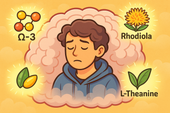
Brain Fog and Body Dysmorphic Disorder: Can Nootropic Supplements Help?
Brain fog often accompanies Body Dysmorphic Disorder, clouding focus and deepening emotional fatigue. Nootropic supplements like L-theanine, Rhodiola, and CoQ10 can help restore mental clarity, balance neurotransmitters, and bring calm energy back to the mind 🌿🧠.
-

How Stress Hormones Like Cortisol May Worsen Body Dysmorphic Disorder
Chronic stress floods the brain with cortisol — the hormone that keeps you on high alert. In Body Dysmorphic Disorder, this chemical overdrive fuels anxiety, distorts self-image, and traps the body in survival mode. Calming cortisol helps restore both peace and perspective 🌿🧠.
-

The Role of Neurotransmitters in BDD—and How Supplements May Help
Neurotransmitters like serotonin, dopamine, glutamate, and GABA shape how people with Body Dysmorphic Disorder perceive themselves. When these brain messengers fall out of balance, perception distorts — but targeted supplements can help restore calm, focus, and emotional regulation 🧠🌿.
-

What Is Body Dysmorphic Disorder? A Deeper Look at the Mind-Body Connection
Body Dysmorphic Disorder (BDD) isn’t just about appearance — it’s about perception. When brain chemistry, trauma, and stress distort self-image, the mind begins to see flaws that aren’t truly there. Healing starts by calming the nervous system and reconnecting mind and body 🪞🧠.
-

Keeping Calm in Competitive Sports: How to Train Your Mind, Body, and Chemistry for Peak Performance
Competitive pressure can overwhelm even the strongest athletes — but calm is trainable. By combining supplements like magnesium, L-theanine, and adaptogens with breathwork and mindset training, you can stay focused, balanced, and in control under any level of stress 🧠🏅.
-
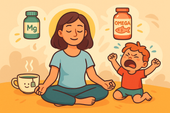
Supplements for Parents Facing Toddler Tantrums: Staying Calm When Little Emotions Run Wild
Toddler tantrums can drain even the most loving parent — but your calm is powerful. With the right supplements like magnesium, L-theanine, and ashwagandha supporting your nervous system, you can stay patient, grounded, and kind, even when emotions run high 🧸🌿.
-

Workplace Stress and Anger Management Support
Workplace stress can quickly turn into frustration — but calm is a skill you can train. By combining supplements like magnesium, L-theanine, and adaptogens with breathwork and mindset tools, you can stay focused, patient, and emotionally grounded no matter how intense the office gets 💼🌿.
-

How to Stay Patient With Family During Stressful Holidays
Holiday gatherings can stir up old stress and test your patience — but calm is possible. With nervous system support from magnesium, L-theanine, and adaptogens, plus mindful breathing and clear boundaries, you can stay centered, kind, and grounded even when family chaos unfolds 🎄💞.
-

Supplements to Keep Calm During Traffic Jams
Getting stuck in traffic doesn’t have to ruin your mood. With calming supplements like magnesium, L-theanine, and ashwagandha, you can train your body to stay relaxed and focused behind the wheel — turning gridlock into a moment of grounded patience 🚗🌿.
-
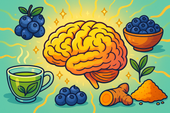
The Role of Antioxidants in Healing Brain Stress from Dissociation
Antioxidants protect the brain from the oxidative stress caused by trauma and dissociation. By neutralizing free radicals and supporting mitochondrial recovery, they help restore clarity, focus, and emotional balance — allowing the mind to heal at the cellular level 🌿🧠.
-
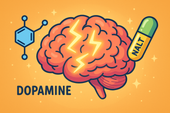
N-Acetyl L-Tyrosine (NALT) for Supporting Mental Clarity
N-Acetyl L-Tyrosine (NALT) fuels dopamine production — the neurotransmitter of focus and motivation. By supporting brain chemistry during stress, NALT helps restore mental clarity, energy, and alertness, making it easier to think clearly and feel present again ⚡🧠.
-

How Ginseng May Improve Focus and Energy in Dissociation
Ginseng helps combat the mental fatigue and fog that often come with dissociation. By supporting mitochondrial energy, balancing neurotransmitters, and regulating cortisol, it gently restores focus, motivation, and emotional presence — helping the mind reconnect with clarity and strength 🌿⚡.
-
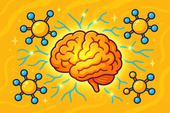
Phosphatidylserine and Dissociation: Supporting Cognitive Function
Phosphatidylserine helps calm the stress response by balancing cortisol, the body’s primary stress hormone. By lowering cortisol spikes, it protects memory, focus, and emotional stability — restoring clarity and mental presence for those struggling with dissociation 🧠🌿.
-
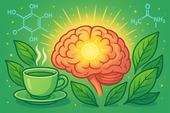
Can Green Tea Extract Help with Dissociative Brain Fog?
Green tea extract may help lift dissociative brain fog by supporting neurotransmitter balance, reducing inflammation, and enhancing energy at the cellular level. With its key compounds EGCG and L-theanine, it promotes calm focus, clarity, and emotional presence — helping you feel more alert and grounded 🍵🧠.
-
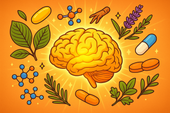
Building a Natural Supplement Stack for Dissociation Support
Building a supplement stack for dissociation means nourishing the brain and body back into communication. By supporting neurotransmitters, gut health, and energy balance through nutrients like magnesium, omega-3s, curcumin, and probiotics, you can help restore clarity, calm, and connection — one layer at a time 🌿🧠.
-

Chamomile and Lavender for Dissociative Anxiety Relief
Chamomile and lavender work together to calm dissociative anxiety by soothing the nervous system and restoring emotional safety. Their natural compounds balance cortisol, enhance GABA activity, and activate the vagus nerve — helping you feel grounded, connected, and at peace again 🌿💜.
-
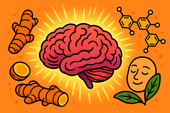
Curcumin for Inflammation and Mental Clarity in Dissociation
Curcumin, the golden compound in turmeric, does more than fight inflammation — it helps clear the mental fog often tied to dissociation. By calming neuroinflammation, balancing neurotransmitters, and supporting mitochondrial energy, curcumin can restore mental clarity, focus, and emotional presence 🌿🧠.
-
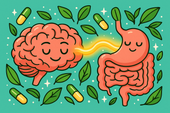
Probiotics and Dissociation: Exploring the Gut–Brain Axis
The gut–brain axis plays a vital role in emotional awareness and presence. When the microbiome is balanced, it supports serotonin production, vagus nerve activity, and calm focus. Probiotics help repair this connection — restoring safety, clarity, and the feeling of truly being in your body again 🌿🧠.
-
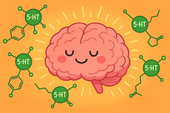
5-HTP for Dissociation: Supporting Serotonin and Emotional Stability
5-HTP helps bridge the gap between emotional numbness and stability by supporting serotonin production — the neurotransmitter that shapes mood, sleep, and sensory awareness. For people experiencing dissociation, 5-HTP may gently restore connection, presence, and emotional balance from the inside out 🌿🧠.

















































